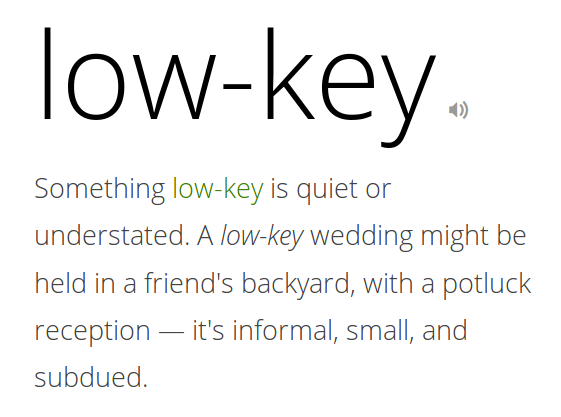Do You Know These Common English Expressions?
In today’s English vocabulary lesson, you’ll learn eight English expressions that are common in the US and Canada:
Get Started
Kick Out
Low-Key
It’s Not Rocket Science
Grab
Cranky
Buy
Out There
Keep reading to learn these eight common English expressions and how to use them in your conversations.
Teaching English Just Got Easier!
Save hours of time with an organized collection of high quality, easy-prep ESL lesson plans and worksheets right at your fingertips.
common North American Expressions
1. Get Started
When we begin doing something, we get started. For example,
“Let’s get started!”
“You need to get started if you want to finish on time.”
‘Get’ is an interesting verb in English because we can combine it with other words to indicate a process of change - from not doing something to doing something. If you’d like to learn more, here’s an article I recently shared about the verb ‘get’ and its common uses.
2. Kick Out
When we kick someone out of a place, we force them to leave. Let’s look at some examples,
“She kicked me out of the room.”
“The government kicked the journalists out of the country.”
We commonly use ‘kick out’ in the passive form with ‘get’. So we can say,
“I got kicked out of class this morning.”
“He got kicked out of school because he cheated on the exam.”
3. Low-Key
When we say that something is low-key we mean that it’s quiet, simple or not intended to attract a lot of attention. ‘Low-key’ is slang and should only be used in casual conversations. Here are a couple of examples,
“I had a low-key weekend.“
“Some couples prefer to have a low-key wedding.”
We can also describe someone as low-key if they’re modest and quiet.
“He’s a low-key person.”
Don’t get confused if you see ‘low-key’ being used as an adverb like in this example,
“I low-key like him.”
This way of using ‘low-key’ is relatively new and it means, ‘secretly’ or ‘kind of’. For example, if I say,
“I low-key want to go to a Backstreet Boys concert.”
It means that I want to go, but I don’t want anyone to know because I’m a bit embarrassed.
4. It’s Not Rocket Science!
We use this informal expression as a joke (or sarcastically) to say that something is very easy to learn or understand. So we can say,
“It didn’t take him long to learn these techniques. It isn’t rocket science.”
“Designing a website may be a lot of work but it's not rocket science.”
5. Grab
Grab is just another way to say ‘take’. For example,
“Grab your coat and follow me.”
“I will grab any opportunity I can to learn something new.”
But if you want to go somewhere to have a beer with your friend, you can say,
“Let’s grab a beer after work.”
We often use ‘grab’ this way when we talk about meals or drinks. For example,
“Should we grab lunch before the concert?”
“Would you like to grab a coffee sometime?”
6. Cranky
Cranky is an informal North American expression that means ‘upset’ or ‘irritable’. So we can say,
“I’m tired and cranky today.”
“Why are you so cranky?”
7. Buy
So you probably know what buy literally means, but sometimes we use buy as slang to mean ‘believe’. For example, if you say, “I don’t buy it!” it means that you don’t believe it. Let’s look at a couple of other examples:
“The police didn’t buy the suspect’s story.”
“I’m not buying any of that nonsense!”
8. Out There
Literally, out there means outside. But it can also be used as slang to mean that an idea (or a person) is extreme, unusual or different from what most people think is normal. So we can say,
“She’s a genius, but some of her ideas are really out there.”
“He’s a bit out there, but he’s a fun character.”
How to Learn Expressions in English
A simple technique that will help you learn new English expressions is to read each one out loud a few times. By doing that, you’ll practice your pronunciation in English, and you’ll also feel more confident about using the expressions in your English conversations.
Another effective technique is to imagine a situation related to each English expression. Visual imagery is powerful and the research confirms it. For example, this study shows that “students who tried to remember words by repeating them over and over again did poorly on recall. In comparison, students who made the effort to make visual associations with the words had significantly better recall.”
Final Thoughts
I hope you found this list helpful! Remember that the word or expression you’re learning might be suitable for that particular context but not other contexts. So when learning new English expressions, make sure you learn the whole phrase, not just the word alone. By practicing the whole phrase, you’ll avoid possible confusion and you’ll make fewer mistakes.
Keep practicing and soon these will come naturally to you! If you found this interesting, please share it with your friends on Facebook or Twitter. Thanks for reading!
















